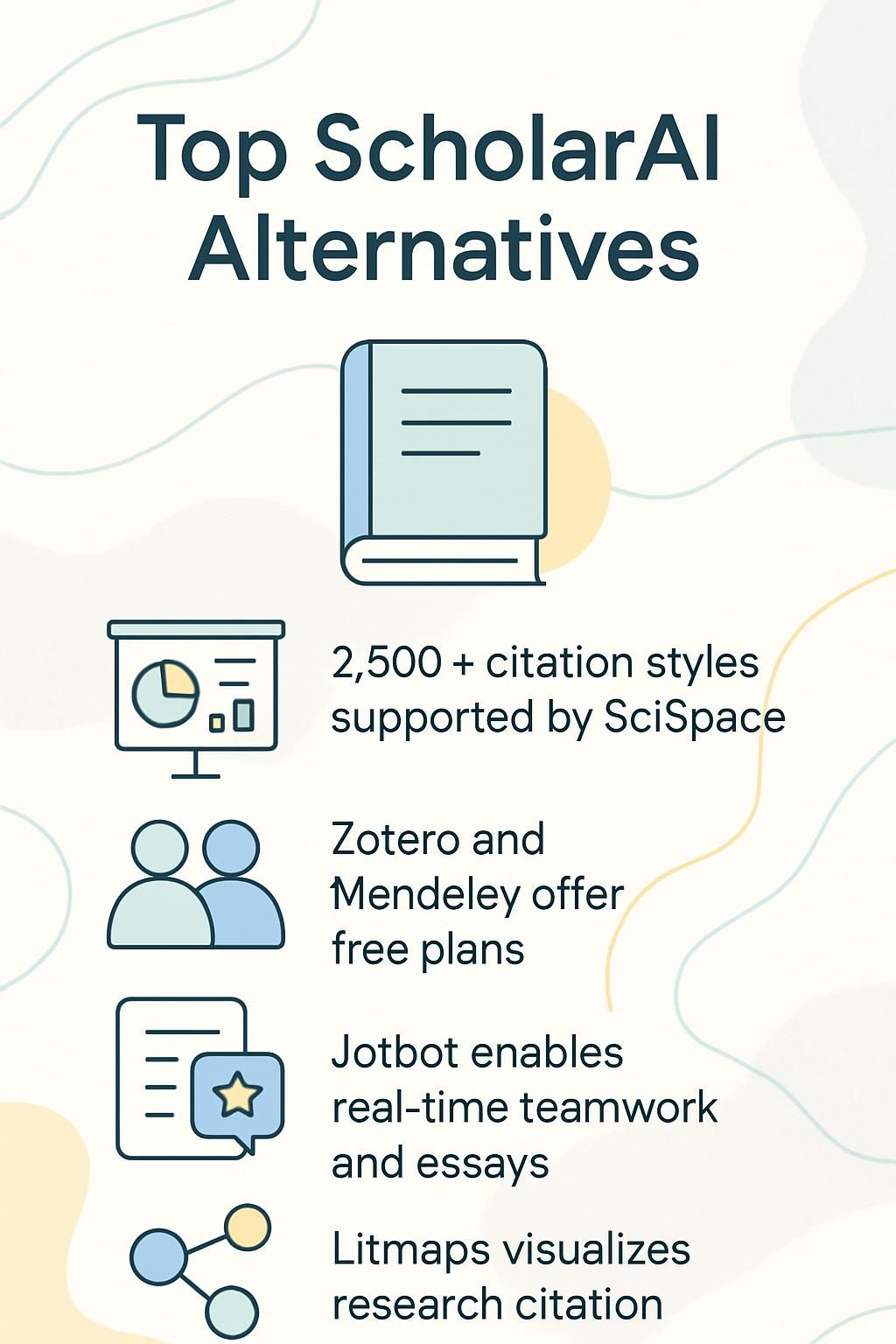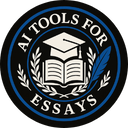Struggling to find the perfect tool for summarizing research papers and managing citations? ScholarAI is a popular choice, but it’s not the only option out there. This guide will introduce you to top alternatives that fit different needs and budgets.
Keep reading to discover tools that make academic research easier!
Key Takeaways
- ScholarAI alternatives like Zotero, Mendeley, and SciSpace offer tools for citation management, AI-powered summaries, and collaboration.
- Zotero and Mendeley provide free plans perfect for students with limited budgets. EndNote offers advanced features but has a steep learning curve.
- Jotbot excels in real-time teamwork and AI essay writing but lacks advanced reference tools found in competitors like EndNote.
- SciSpace summarizes PDFs quickly and supports 2,500+ citation styles but lacks mobile apps for on-the-go use.
- Litmaps and Research Rabbit focus on visualizing citation connections to explore research trends effectively.

Key Features to Look for in ScholarAI Alternatives
Picking the right tool means focusing on what matches your research style. Think about how it handles tasks like summarizing, sharing files, or managing references.
Integration with reference management tools
Tools like Zotero and Mendeley make organizing research smoother. Zotero grabs references from databases, journals, or even websites. It also supports group libraries, handy for team projects.
Scholars working on technical papers can benefit from its LaTeX support.
EndNote works well with Google Docs and Microsoft Word. You can insert citations directly while writing essays or theses. RefWorks offers cloud-based citation management without needing installation.
For offline needs, Zotero allows limited access when the internet is slow or unavailable.
AI capabilities for summarization and research assistance
AI tools save time by summarizing long papers and breaking them into sections. Scholarcy helps researchers by making texts easier to read. It highlights key points, speeding up study sessions.
SciSpace goes further, pulling crucial facts and creating instant summaries from academic PDFs.
Other AI options like Elicit use GPT-3 to find related research fast. They create literature reviews and digest entire studies quickly. Semantic Scholar uses machine learning for TLDRs on over 60 million papers, helping users stay focused without skimming pages endlessly.
Up next: Collaboration and sharing features that enhance teamwork in research!
Collaboration and sharing features
Jotbot shines with its multi-user collaboration features. It supports real-time teamwork, revision control, and document sharing. Mendeley steps up by offering tools to annotate and discuss academic papers directly with teams.
Zotero lets users create group libraries for seamless file sharing during team projects.
Litmaps brings citation maps into the mix, allowing shared visualization of research trends. Research Rabbit streamlines collaboration by enabling easy reference sharing within research groups.
Paperpile adds a layer of advanced discussion options, making it simpler to share insights during literature reviews or project discussions.
Next up: Cost and accessibility considerations in your search for ScholarAI alternatives!
Cost and accessibility
Prices vary widely for these tools. Zotero and Mendeley offer free versions, perfect for tight budgets. SciSpace begins at $20 per month, but annual plans lower the cost to $12 monthly with discounts like DHRUVIR40 (40% off).
Users seeking cheaper options may consider Recall Premium, priced at $7 per month annually with code RECALL10.
Other tools include Paperpal Prime at $139 yearly with 30% off using DZ30 or Zendy Tools costing $79.80 a year. Meanwhile, Julius AI’s Team plan costs $70 per user monthly, but basic access starts at just $20.
With offers like DHRUVIR10 providing 10% savings on some platforms, affordability rests on your research needs and budget flexibility.
Jotbot: The All-in-One Document Assistant
Jotbot simplifies research with AI tools, making tasks like data analysis and reference tracking a breeze—check out how it can boost your workflow.
Features & Benefits of Jotbot
Jotbot makes organizing research simple. It condenses lectures, presentations, and videos using AI summarization tools. Users rely on its grammar checks, plagiarism detection, and formatting options to polish their documents.
The platform’s free source finder helps students and researchers dig up relevant materials fast. Its note organization tool ensures efficient sorting and easy categorization of data for academic projects.
Collaboration becomes seamless with Jotbot’s multi-user feature. Teams can work together in real time while tracking changes effortlessly. Easy Google sign-in simplifies onboarding for new users across devices like laptops or tablets.
Trusted by over 1 million people globally, it also stands out with an AI-powered essay writer that drafts papers needing only minor adjustments from the user. Dive deeper into its pros next!
Pros & Cons of Jotbot
Jotbot is a powerful tool for managing research and writing tasks. It simplifies work with its AI-driven features, but it may not suit everyone.
Pros:
- Offers an all-in-one platform for note-taking, summarization, citations, and essay writing.
- Free to use without any subscription fees or hidden costs.
- Quick setup via Google sign-in allows easy cross-device syncing for better productivity.
- Widely trusted by universities and businesses for academic and professional use.
Cons:
- AI-generated essays need user review to maintain quality and accuracy.
- Lacks advanced reference management tools found in competitors like EndNote or Zotero.
- The variety of features can overwhelm users who prefer simpler tools.
- Limited customization options compared to specialized software solutions for researchers like Mendeley or Zotero.
SciSpace: AI Research Writing Assistant
SciSpace simplifies research with smart tools, offering quick summaries and writing help—read on for the full scoop!
Features & Benefits of SciSpace
SciSpace simplifies academic research with AI tools. It extracts key points from PDFs instantly, saving hours of reading time. Its smart notebook organizes information neatly and adds AI-assisted notes for better clarity.
Over 2,500 citation styles are available to make referencing easier. The Chrome extension integrates seamlessly with web-based research, streamlining your workflow across multiple sites.
Multilingual support makes it a global tool for diverse researchers. Audio conversion transforms documents into podcasts for accessibility on the go. SciSpace also features a citation generator and paraphrasing tools to prevent plagiarism hassle-free.
Pricing is affordable, offering a free plan or premium options starting at $12 per month annually, with discounts up to 40%.
Pros & Cons of SciSpace
SciSpace offers helpful tools for academic writing. It combines AI with features to make research easier.
Pros:
- Includes AI chat for real-time research help, making answers quick and clear.
- Offers support for summarizing long texts, saving time during studies.
- Allows smooth integration with reference management software like EndNote or Zotero.
- The interface is user-friendly, reducing the learning curve for new users.
- Works well as a productivity tool when dealing with PDF annotations or outlines.
Cons:
- Limited collaboration options can hinder group work efficiency.
- Doesn’t include mobile app functionality, restricting use on phones or tablets.
- Detecting plagiarism may flag content incorrectly at times.
EndNote: Comprehensive Reference Management Tool
EndNote keeps your citations neat, saves time with smart features, and simplifies academic writing—worth exploring its perks!
Features & Benefits of EndNote
Manage citations easily with EndNote. It supports large research libraries and advanced citation organization for big projects. Academic researchers can import PDFs directly, saving time.
Integration with LaTeX simplifies tasks for technical fields like computer science.
Collaborate seamlessly in groups using its sharing tools. Create bibliographies directly within Word or other major editors. With cross-referencing features, accuracy checks become simpler.
It also connects smoothly to research databases like PubMed for data analytics and library access.
Pros & Cons of EndNote
EndNote is a strong tool for managing references and citations. It helps researchers handle detailed academic tasks easily.
Pros
- Offers powerful citation and reference management features for research.
- Supports large-scale academic workflows, perfect for complex projects and theses.
- Allows users to collaborate with research teams, simplifying shared tasks like data management and analysis.
- Provides integration with tools like Microsoft 365 and PDF format support, improving productivity.
Cons
- Has a steep learning curve that may confuse new users or students unfamiliar with such software.
- Lacks automated summarization features found in some alternatives like ScholarAI or Google Gemini.
- Requires payment through subscription plans, which can strain budgets for some students or small teams.
- Feels less user-friendly when dealing with basic citation needs compared to simpler tools.
Next, let’s explore Zotero’s capabilities as an open-source alternative!
Zotero: Open-Source Research Tool
Zotero helps organize research, save citations, and collaborate with ease—perfect for students and researchers eager to streamline their work.
Features & Benefits of Zotero
Store, organize, and cite sources easily with Zotero. It grabs references from websites, journals, or databases directly into your library. Using its PDF management feature, you can highlight and annotate files for better note-taking.
Its group libraries help teams collaborate on research projects in real time. With automatic citation styles and offline access, it suits both students and professionals handling academic tasks or thesis writing.
Plus, it’s free and open-source for all users!
Pros & Cons of Zotero
Zotero is a well-known tool for researchers. It helps organize references and manage citations effectively.
Pros:
- Free to use, making it accessible to students and researchers on a budget.
- Open-source design allows for community improvements and updates.
- Simple integration with browsers for collecting web-based references quickly.
- Supports group projects by enabling shared libraries and teamwork features.
- Compatible with Microsoft Word, Google Docs, and LibreOffice for easy citation management.
Cons:
- Does not include automated summarization or AI-driven research tools like ScholarAI alternatives may offer.
- Less effective at mapping complex citation networks or providing advanced recommendations compared to other options like Litmaps or Research Rabbit.
- Heavy reliance on cloud services can limit offline access in critical moments without internet connectivity.
- Not ideal for large-scale PDF annotation, which some users may need during intensive studies or data analysis tasks.
Mendeley: Social Network for Researchers
Mendeley brings researchers together, offering tools for organizing papers and connecting with peers—dig into the details to see if it fits your needs!
Features & Benefits of Mendeley
Get free citation management with Mendeley! Students and researchers can organize sources easily. Its PDF annotation tool helps take detailed notes directly on documents, saving tons of time.
You can sync data across devices through the cloud, keeping your work accessible anywhere.
The platform supports LaTeX for technical writing fields like physics or math. It offers academic social networking to find collaborators or share ideas globally. A paper recommendation engine suggests relevant studies for your research needs.
Connect it with academic databases to improve efficiency while researching and analyzing data effortlessly!
Pros & Cons of Mendeley
Mendeley is a popular academic research tool. It combines a citation manager with features for collaboration.
- Pros: Free to use, making it accessible to students and researchers on a budget.
- Pros: Offers annotation tools, so users can add comments directly to PDFs.
- Pros: Includes cloud sync, which allows access to documents on multiple devices anytime.
- Pros: Acts as a social network for researchers, enabling easy sharing of papers and ideas.
- Cons: Annotation features are basic, lacking advanced editing options present in other tools.
- Cons: Collaboration tools may feel limited compared to paid alternatives like EndNote or SciSpace.
- Cons: The focus on networking might not suit users seeking simpler reference management.
Research Rabbit: Citation Management Simplified
Research Rabbit makes organizing citations quick and easy, helping researchers stay on track—read on to discover its perks!
Features & Benefits of Research Rabbit
Research Rabbit simplifies citation management with its integrated tools. It organizes references seamlessly, making academic research less stressful. Users can visualize intricate citation networks to understand relationships between studies.
This helps identify emerging trends and significant works quickly. Its AI-driven recommendations save time by suggesting relevant papers aligned with your interests.
The platform excels with its network mapping feature for literature reviews. It assists researchers in exploring citation pathways for efficient examination of topics. Teams benefit from collaboration and sharing tools that enhance teamwork on projects.
Research Rabbit supports work both on desktops and in the cloud, offering accessibility anywhere.
Pros & Cons of Research Rabbit
Jumping from features to verdicts, Research Rabbit is a handy tool for academics. It simplifies citation management but has clear strengths and weaknesses.
- Pros: Its AI-powered paper recommendations make finding relevant studies faster.
- Pros: The platform supports team-based research, making collaboration smoother.
- Pros: Users can discover citation networks, helping trace academic connections easily.
- Cons: There is no automated summarization or learning aid available.
- Cons: Focus leans more on discovery than formatting citations properly.
- Cons: Reference management options feel limited compared to dedicated tools.
Litmaps: Visualizing Citation Connections
Litmaps shines by turning complex citation data into clear, visual maps, making research faster and more intuitive—curious yet?
Features & Benefits of Litmaps
Litmaps delivers detailed visual citation maps, helping users explore academic research connections with ease. Its real-time notifications keep researchers updated on new papers in their areas of interest.
This tool tracks trends and highlights key citation patterns for faster insights.
Collaboration becomes seamless by allowing teams to share and work together on these citation maps. AI-driven recommendations refine literature discovery across different disciplines.
It’s a great choice for following developments in fast-moving research fields while supporting thorough, collaborative reviews.
Pros & Cons of Litmaps
Litmaps helps researchers track and visualize citations. It simplifies understanding connections in academia.
Pros
- Tracks citation connections effectively, saving time for researchers.
- Updates in real-time, keeping users informed quickly.
- Promotes collaboration through its map-sharing feature, ideal for group research.
Cons
- Does not include tools for summarizing documents or learning content efficiently.
- Focuses mainly on tracking citations, limiting broader research needs.
- Provides fewer features for managing references compared to top alternatives like Mendeley or Zotero.
Comparing ScholarAI Alternatives with Other Market Leaders
Comparing ScholarAI alternatives side-by-side helps you quickly spot what works best for your research needs. The tools each shine in their own way, like gems in a crown. Here’s a snapshot comparison:
| Feature/Tool | ScholarAI | Jotbot | SciSpace | Zotero | Mendeley |
|---|---|---|---|---|---|
| Database Size | 207M+ papers | Not publicly listed | Broad library access | Customizable sources | Extensive repository |
| Summarization | Yes, AI-powered | Available with notes | Yes, article-focused | Manual tools | Not AI-driven |
| Collaboration | Basic sharing tools | Annotations supported | Team-friendly features | Cloud-based sharing | Social network built-in |
| Citation Management | Limited | Fully integrated | Moderate | Top-notch | Extensive features |
| AI Recommendations | TLDR summaries | Essay suggestions | Research-focused | Not available | Via community sharing |
| Cost | Free & Premium | Varied pricing tiers | Affordable plans | Free | Free & Premium |
Some tools excel at organization, others focus on AI or sharing. Choose wisely based on what fits your workflow.
How to Select the Right Alternative for Your Needs
Pick a tool that works smoothly with your current tasks. Factor in costs and features to match your priorities.
Workflow compatibility
Good workflow compatibility makes or breaks a research tool. Zotero, EndNote, and Paperpile let users insert citations directly into writing platforms like Word or Google Docs. This feature saves time and reduces hassle during academic writing.
Researchers using LaTeX benefit from Mendeley and EndNote’s integration support. For offline work, Zotero stands out with its reliable access in low-connectivity areas. Tools like Mendeley also shine by offering cloud storage for remote collaboration without interruptions.
Budget considerations
Budget matters a lot. Zotero and Mendeley shine with free tiers, perfect for tight budgets. SciSpace Premium costs $12 per month annually, while monthly plans are $30. Use DHRUVIR20 or DHRUVIR40 for up to 40% off.
Paperpal Prime is priced at $25 per month but goes down with bulk payments. Recall Premium offers a low-cost option at $7 per month with an annual plan and RECALL10 code. For visual tools like Litmaps, pricing may vary but often remains competitive within similar research platforms.
Choose wisely based on your wallet!
Specialized research features
Some tools offer standout research features to make academic tasks simpler. Semantic Scholar provides TLDR summaries for over 60 million papers. This makes scanning large studies fast and easy.
Similarly, Litmaps sends real-time updates about new work in chosen fields, so researchers stay on top of trends.
Research Rabbit and Litmaps visualize citation networks effectively. They help uncover patterns and connect related topics quickly. Recall uses spaced repetition methods for better long-term memory retention.
It’s smart for building knowledge without constant rereading or forgetting key ideas! These advanced functions save time while boosting productivity during complex projects.
Conclusion
Choosing the right ScholarAI alternative can elevate your research game. Each tool brings its own strengths to the table, whether it’s better citation management or smarter AI features.
Focus on what fits your workflow and budget best. Don’t hesitate to mix and match tools for a smoother experience. The perfect setup could be just one click away!
FAQs
1. What are some popular ScholarAI alternatives?
Some well-known ScholarAI alternatives include Microsoft Copilot, Hugging Face, and Mistral AI. These tools support academic research and productivity tasks.
2. Can these alternatives help with academic research?
Yes, many of these tools assist with outlining, analyzing data, and managing tags for better organization during research.
3. Are there any AI chatbots among the alternatives?
Absolutely! Options like Meta AI offer chatbot features to improve interaction while working on projects or answering questions.
4. How do these tools handle plagiarism concerns?
Several Scholarcy alternatives come equipped with plagiarism checkers to maintain quality management in writing and ensure originality.
5. Do they integrate well with other platforms or APIs?
Yes, most of these tools provide API integrations that work seamlessly across platforms like Twitter or web-based applications for advanced functions such as anomaly detection or data science tasks.

